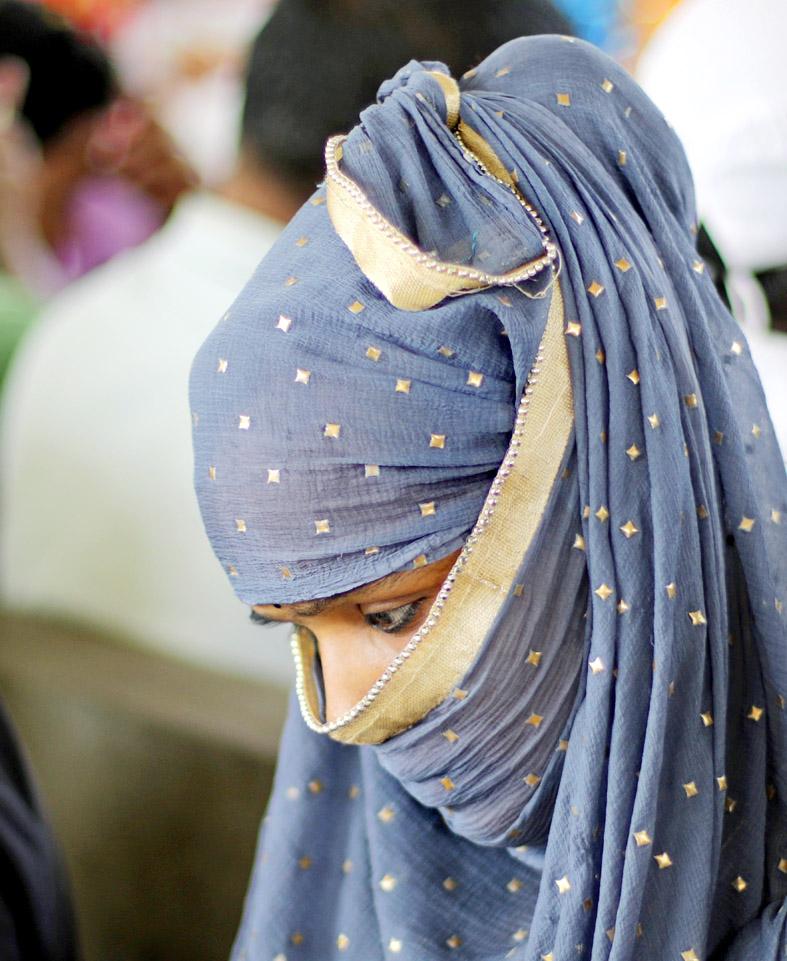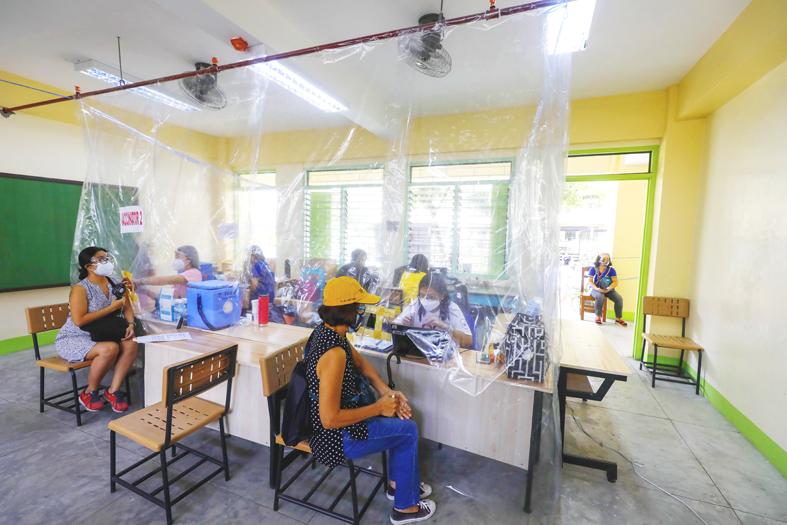India’s worst-hit state ramped up its COVID-19 restrictions as nationwide the daily infections yesterday exceeded 100,000 for the first time.
The US is the only nation that has regularly registered so many cases in one day. Brazil recorded triple digits once last month. In India, hopes at the start of the year that the outbreak might be subsiding in the nation of 1.3 billion people have been dashed in recent weeks as a fresh wave pushed the national total to 12.5 million infections and 165,000 deaths.
Maharashtra, the worst-hit state and home to Mumbai, India’s financial and entertainment capital, recorded nearly 60,000 cases in the past 24 hours.

Photo: EPA-EFE
Struggling state authorities on Sunday tightened the evening curfew to allow only people involved in essential services out of their homes from 8pm to 7am.
The region of 110 million people would also see weekend lockdowns, with gatherings of more than 400 people banned and places of worship and restaurants shut.
In Mumbai over the weekend, one of Bollywood’s biggest stars, Akshay Kumar, became the latest celebrity to test positive.

Photo: EPA-EFE
Shooting of the religious epic Ram Setu that Kumar was making was yesterday halted after 45 crew members also tested positive.
“How long shooting remains halted depends on Akshay Kumar’s recovery. We can replace all our crew members, but we cannot replace the star of the film,” Ashok Dubey from the Federation of Western India Cine Employees said.
In New Delhi, Chief Minister Arvind Kejriwal has ruled out a new lockdown, despite the surge in cases.
Police said they are issuing more fines to people not wearing masks.
Authorities in the Philippines yesterday extended a lockdown by another week after an alarming spike in COVID-19 infections continued to surge and started to overwhelm many hospitals in the capital and outlying regions.
Philippine President Rodrigo Duterte placed Metropolitan Manila and four outlying provinces, a region of more than 25 million people, under lockdown last week as daily infections breached 10,000.
Roman Catholic leaders shifted Holy Week and Easter events online after all public gatherings, including in places of worship, were temporarily banned.
The government-run Lung Center of the Philippines became the latest hospital in the capital region to announce over the weekend that it could no longer accept walk-in patients after its COVID-19 ward reached full capacity and its emergency room was handling twice its capacity.
“We are not just full. We are very full. In fact, the hospital has been full for the past two weeks,” Lung Center spokesman Norberto Francisco said.
Other hospitals said they could expand bed capacity, but lacked medical workers partly because many had been infected.
Duterte’s administration has increasingly faced criticism of mishandling the pandemic, but presidential spokesman Harry Roque said that the spread of more infectious COVID-19 variants came as a surprise.

The Ministry of the Interior (MOI) is to tighten rules for candidates running for public office, requiring them to declare that they do not hold a Chinese household registration or passport, and that they possess no other foreign citizenship. The requirement was set out in a draft amendment to the Enforcement Rules of the Public Officials Election and Recall Act (公職人員選舉罷免法 ) released by the ministry on Thursday. Under the proposal, candidates would need to make the declaration when submitting their registration forms, which would be published in the official election bulletin. The move follows the removal of several elected officials who were

The Republic of China (ROC) is celebrating its 114th Double Ten National Day today, featuring military parades and a variety of performances and speeches in front of the Presidential Office in Taipei. The Taiwan Taiko Association opened the celebrations with a 100-drummer performance, including young percussionists. As per tradition, an air force Mirage 2000 fighter jet flew over the Presidential Office as a part of the performance. The Honor Guards of the ROC and its marching band also heralded in a military parade. Students from Taichung's Shin Min High School then followed with a colorful performance using floral imagery to represent Taiwan's alternate name

FOUR DESIGNATED AREAS: Notices were issued for live-fire exercises in waters south and northwest of Penghu, northeast of Keelung and west of Kaohsiung, they said The military is planning three major annual exercises across the army, navy and air force this month, with the navy’s “Hai Chiang” (海強, “Sea Strong”) drills running from today through Thursday, the Ministry of National Defense said yesterday. The Hai Chiang exercise, which is to take place in waters surrounding Taiwan, would feature P-3C Orion maritime patrol aircraft and S-70C anti-submarine helicopters, the ministry said, adding that the drills aim to bolster the nation’s offshore defensive capabilities. China has intensified military and psychological pressure against Taiwan, repeatedly sending warplanes and vessels into areas near the nation’s air defense identification zone and across

A Chinese takeover of Taiwan would severely threaten the national security of the US, Japan, the Philippines and other nations, while global economic losses could reach US$10 trillion, National Security Council Deputy Secretary-General Lin Fei-fan (林飛帆) wrote in an article published yesterday in Foreign Affairs. “The future of Taiwan is not merely a regional concern; it is a test of whether the international order can withstand the pressure of authoritarian expansionism,” Lin wrote in the article titled “Taiwan’s Plan for Peace Through Strength — How Investments in Resilience Can Deter Beijing.” Chinese President Xi Jinping’s (習近平) intent to take Taiwan by force